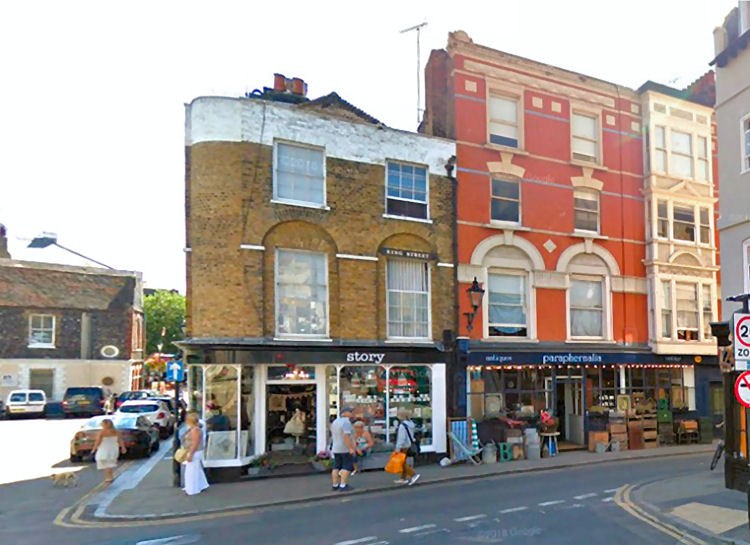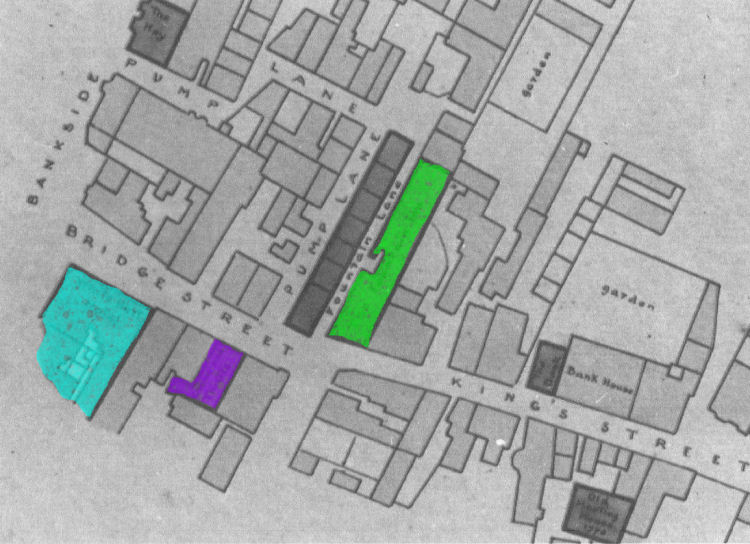|
Bridge Street
Margate

Above photo, 2018, kindly sent by Debi Birkin. Showing the terracotta coloured
building that looks to be late Victorian, but the pub probably looked
more like the surviving Georgian building on the corner. |

Above map 1821, showing the location of the "Crown and Thistle" in
purple. "White Hart" in
blue, "Fountain" in
green. |
The only instant I have found for this pub is from the following
newspaper article in 1809. However I also have reference to a "Crown and
Anchor" and "Crown and Sceptre."
Further research has now predated this to 1782.
Further research from Michael Mirams has found the location on an 1821
map, but it is not shown on the 1852 map. It was located in Bridge Street
which is now an extension of King Street, and was just down the road from
the "White Hart Hotel."
|
Kentish Gazette - Wednesday 22 May 1782.
To be Sold to the HIGHEST BIDDER, At the "Crown and Thistle" in Margate.
On Tuesday the 28th of of May, 1782, About Six o’Clock in the Afternoon,
ALL that Freehold MESSUAGE or TENEMENT, with the Ground and Appurtenance
thereto belonging, situate in Love Lane, in Margate and now in the
Occupation of John Stevens.
For further Particulars enquire of Mr. Small, attorney, at Margate.
|
|
Kentish Chronicles, 15 September, 1795.
Late on Thursday night, the "Crown and Thistle Inn, at Margate, kept
by Mr. Goodwin was robbed of various articles of plate to the amount
of £20. They entered the house by breaking into the billiard room,
and escaped with the booty without detection.
|
|
From the Kentish Weekly Post or Canturbury Journal, Friday 29th September, 1797.
Lately died at Margate, Mrs. Sacket, widow, of High Street; and Mr. John
Paine, late master of the "Crown and Thistle," King's Street, but from
which he had retired, with a competency, a few years since.
|
|
Kentish Weekly Post or Canterbury Journal 17 October 1809.
On Friday morning last Jethro Miller, late master of a gun-brig, was
found in his bed-room at the "Crown and Thistle," Margate, with his
throat cut, and dead; he perpetrated the act with a razor, which was
found in the blood. On Saturday the Mayor of Dover, took an inquest on
view of the body. It appeared in evidence, that the deceased had
previously been in a distracted state of mind, and had been discharged
from the navy on account of epileptic fits; the jury therefore returned
a verdict of Lunacy. The above is the second inquest taken by the Mayor
at the same place within the last month, the first of which was also a
case of lunacy.
(He was 36 years of age.)
|
LICENSEE LIST
GOODWIN Mr 1795+
EVANS Edward 1923+
|

